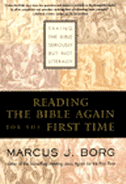Section
|
Reading the Bible Again for the First Time A Cyberspace Discussion Group Foundations: The Hebrew Bible - |

Back to Index
| It is recommended to click the Refresh or Reload button to ensure current information. |
|
 Back to Index |
| Click on the 3 sections below for materials according. | ||
| SUMMARY | REFERENCES | COMMENTS |
| The classic prophets of ancient Israel are
among the most remarkable people who
have
ever lived. Their message combines
radical
criticism of the way things are with
urgent
advocacy of another way of being. The
three
major prophets are Isaiah, Jeremiah
and Ezekiel,
while three of the minor prophets are
Hosea,
Zechariah and Obadiah. The classical
prophets
belong to the time of the divided kingdom
after the death of Solomon, and they
lived
through the period of destruction,
exile
and return. Three "Hearings" of the Prophets As a child, Borg first heard the prophets spoken of primarily as predictors of the messiah. Matthew, for example uses quotes from the prophets to suggest they were supernaturally inspired predictors of Jesus. He no longer believes that to be true. Their words are not the product of prediction and fulfillment, but of prophecy historicized. In other words, the New Testament authors used passaes from the Hebrew Bible to generate historical narrative. They took a passage out of its ancient context and gave it a meaning very different from what the prophet had intended. They did this to plant Jesus firmly in the Jewish prophetic tradition. Later, Borg was attracted to prophets like Amos who, while they did not write the books attributed to them, were masters of oratory and had disciples who put their words into written form. Many of the prophetic utterances were electrifying. In Amos, Borg heard for the first time the prophetic passion for social justice. This marked a new stage in Borg's perception of the Bible, of Christianity and of the world. In seminary, Borg learned about prophetic 'acts'. These public displays were like street theatre (e.g. Isaiah walking naked and barefoot through the streets of Jerusalem to demonstrate against Judah's formation of a military alliance with Egypt). These messages spoke of social justice, antiestablishment demonstration and dire warnings to the people. The 'call stories' of the prophets, their commissioning to service by God, also affected Borg. It convinced him that experiences of the sacred do happen, that the prophets experienced them, and that these events were foundational for them in their ministries. The prophets usually suffered for their efforts because they tended to challenge the rich and the powerful. It is important to understand the social systems addressed by the prophets. The social systems of the day were controlled and shaped by elites of power and wealth to serve their own interests. The prophets had little official status. They could only take courage from their trust in God. They were 'God-intoxicated' and passionate men. The conflict between domination systems and the will of God runs through the Hebrew Bible as a whole. Criticizing and Energizing The two primary dimensions of prophetic activity can be viewed as criticizing and energizing. They challenged the people when that was necessary. But they also brought them comfort and hope. Prophetic criticizing and energizing are most relevent to our time when we hear what the prophets were saying in their time, not when we divorce them from their time and imagine that they were predicting a distant future. It is in their role as critics and energizers that we in our time can best hear and learn from the prophets. We need to come to understand what their message of social justice (opposition to systemic injustice) can mean for us today. The prophets spoke of a journey of return, after a period in the wilderness. Imagining the religious life as a 'way' a 'path' or a 'journey' is central not only to the classic prophets but to Judaism, Christianity and other religious traditions. The journey of return leads to the place where we began: to paradise, Jerusalem, Zion; all symbolizing the place of God's presence. |
 |
St. David's United Church.Calgary, Alberta, Canada.
The United Church of Canada.
November 5, 2001, feb 22, 04